Pitchcare Conservation Day a success
Summer was very much still in the air as Pitchcare's first ever Conservation Day was held at Enville Golf Club in Staffordshire.
Responding to an appetite for management techniques, tips and information that can help Course Managers and Greenkeepers improve areas for the benefit of wildlife and, correspondingly, for the sport and ultimately the industry, Pitchcare brought together a group of experts from the RSPB and Ecological Consultancies to provide workshops to discuss habitat management.
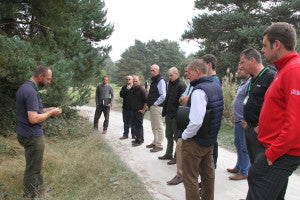
There was then an opportunity to attend one of two workshops, one focusing on woodland management, provided by Nigel Symes, co-author (with Keith Duff) of Birds and Golf Courses: a guide to habitat management.
A second workshop was led by John Handley, looking at rough management, the ecological requirements for different grass species, surveying and creating a monitoring scheme to establish the optimum grassland for wildlife benefit.
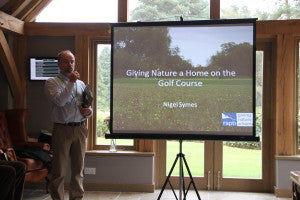
The first considered the Management of Aquatic Systems and was presented by Mark Duffell of Arvensis Ecology. This looked at the various forms of algae and recommendations on how to prevent and reduce its occurrence, leading on to creating a balanced system, selecting appropriate macrophytes and identifying and controlling invasive species, with particular emphasis on non-native Schedule 9 species.
The second presentation, provided by Nick Cooper, Senior Project Manager at Laverstoke Park, examined soil biology and the soil food-web. This presentation looked at mycorrhiza, protozoa, flagels, ciliates, amoebas and nematodes, considering their place within the nutrient cycle and food-web. The discussion was lively and covered the use of compost teas, seaweed, humic acid and the theory of competitive exclusion.
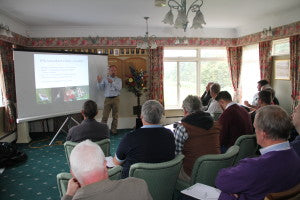
There was a break for lunch, during which attendees could talk directly with the speakers, as well as invited guests, who were able to demonstrate how they can be of assistance in helping a Course Manager achieve the aims of conservation.
Three members of the Staffordshire Wildlife Trust, including Wildlife Site Coordinator, David Cadman, were on hand to discuss Higher Level Stewardship as well as access to potential funding and other useful resources. The Staffordshire Wildlife Trust and Enville Golf Course have an excellent relationship, sharing expertise and resources to improve areas for the benefit of the wildlife on Highgate Common, the adjacent nature reserve and the golf course.

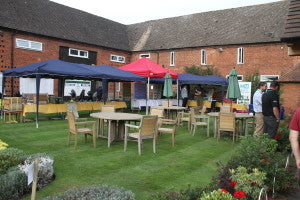
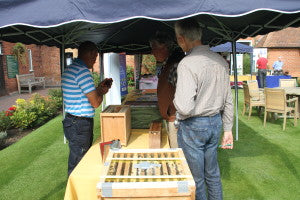
Martin George from CJ Wild Bird Foods was also on hand to discuss feeding stations, nest boxes, seed mixtures and offer specialist advice. Both Limagrain and Johnsons DLF were in attendance to provide guidance on the selection of appropriate grass and wildflower seed mixtures, and there was a display of several bee populations provided by Ed Ainsworth, Course Manager at Avro Golf Club in Stockport. Edward explained how the colonies worked and how important it was for their well-being that appropriate management practices were adopted.
In the afternoon, Jonathan Wood conducted a course walk during which he explained the conservation work he was undertaking, pointing out areas that had been successful and explaining how much the members enjoyed seeing so much wildlife when playing the course.
Enville Golf Course was a truly inspiring venue, as the benefits of appropriate management were clearly on display. It was a real delight to see Green Woodpeckers and know that the rough management favoured their presence.
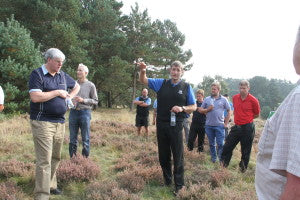
The heather looked incredibly healthy and prolific, important when one considers that we've lost five sixths of lowland heath in the last 200 years and Britain represents 20% of the European total.
The example of Enville Golf Course demonstrates that management practices that were discussed can provide real benefit for everyone and help correct a poor public perception.
Here are a few comments from some of the attendees:
"Great venue, great atmosphere (friendly, informal, open). Can't wait until the next one. Well done." Frank Newberry
"The event and format was good." Laurence Pithie MG, Turf Master One Ltd
"Very enjoyable informative day overall, thanks very much." Stuart Thompson, St George's Park
"It was a very useful day and I was consistently satisfied with the services provided." Brett Moggridge, Kirtlington Golf Club
"Great event- I shall be trying out my free bag of compost shortly." Peter Richmond, BCPC
Pitchcare will be holding more Conservation Day events in the future. If you would like to host one of these events, please contact Lynsey Gale - email Lynsey.Gale@pitchcare.com
